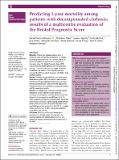Files in this item
Predicting 1-year mortality among patients with decompensated cirrhosis : results of a multicentre evaluation of the Bristol Prognostic Score
Item metadata
| dc.contributor.author | Bowers, Sarah Pauline | |
| dc.contributor.author | Clare, Kathleen | |
| dc.contributor.author | Hagerty, Louise | |
| dc.contributor.author | McColl, Kirsty | |
| dc.contributor.author | Smith, Eva | |
| dc.contributor.author | Brown-Kerr, Alana | |
| dc.contributor.author | Ahmed, Asma | |
| dc.contributor.author | Finlay, Fiona | |
| dc.contributor.author | Dillon, John F. | |
| dc.contributor.author | Barclay, Stephen | |
| dc.date.accessioned | 2022-11-10T12:30:12Z | |
| dc.date.available | 2022-11-10T12:30:12Z | |
| dc.date.issued | 2022-03-22 | |
| dc.identifier | 282093905 | |
| dc.identifier | 839639c6-3652-4c99-992e-fa7e8ab183be | |
| dc.identifier | 85127642659 | |
| dc.identifier.citation | Bowers , S P , Clare , K , Hagerty , L , McColl , K , Smith , E , Brown-Kerr , A , Ahmed , A , Finlay , F , Dillon , J F & Barclay , S 2022 , ' Predicting 1-year mortality among patients with decompensated cirrhosis : results of a multicentre evaluation of the Bristol Prognostic Score ' , BMJ Open Gastroenterology , vol. 9 , no. 1 , e000822 . https://doi.org/10.1136/bmjgast-2021-000822 | en |
| dc.identifier.issn | 2054-4774 | |
| dc.identifier.other | ORCID: /0000-0003-0722-8318/work/122719719 | |
| dc.identifier.uri | https://hdl.handle.net/10023/26362 | |
| dc.description.abstract | Objective Chronic liver disease continues to be a significant cause of morbidity and mortality yet remains challenging to prognosticate. This has been one of the barriers to implementing palliative care, particularly at an early stage. The Bristol Prognostic Score (BPS) was developed to identify patients with life expectancy less than 12 months and to act as a trigger for referral to palliative care services. This study retrospectively evaluated the BPS in a cohort of patients admitted to three Scottish hospitals. Method Routinely collated healthcare data were used to obtain demographics, BPS and analyse 1-year mortality for patients with decompensated liver disease admitted to three gastroenterology units over two 90-day periods. Statistical analysis was undertaken to assess performance of BPS in predicting mortality. Results 276 patients were included in the final analysis. Participants tended to be late middle-aged men, socioeconomically deprived and have alcohol-related liver disease. A similar proportion was BPS+ve (>3) in this study compared with the original Bristol cohort though had more hospital admissions, higher ongoing alcohol use and poorer performance status. BPS performed poorer in this non-Bristol group with sensitivity 54.9% (72.2% in original study), specificity 58% (83.8%) and positive predictive value (PPV) 43.4% (81.3%). Conclusion BPS was unable to accurately predict mortality in this Scottish cohort. This highlights the ongoing challenge of prognostication in patients with chronic liver disease, furthering the call for more work in this field. | |
| dc.format.extent | 6 | |
| dc.format.extent | 324439 | |
| dc.language.iso | eng | |
| dc.relation.ispartof | BMJ Open Gastroenterology | en |
| dc.subject | Chronic liver disease | en |
| dc.subject | Liver | en |
| dc.subject | Liver cirrhosis | en |
| dc.subject | RC Internal medicine | en |
| dc.subject | Gastroenterology | en |
| dc.subject | NDAS | en |
| dc.subject | SDG 3 - Good Health and Well-being | en |
| dc.subject | MCC | en |
| dc.subject.lcc | RC | en |
| dc.title | Predicting 1-year mortality among patients with decompensated cirrhosis : results of a multicentre evaluation of the Bristol Prognostic Score | en |
| dc.type | Journal article | en |
| dc.contributor.institution | University of St Andrews. School of Medicine | en |
| dc.contributor.institution | University of St Andrews. Population and Behavioural Science Division | en |
| dc.identifier.doi | https://doi.org/10.1136/bmjgast-2021-000822 | |
| dc.description.status | Peer reviewed | en |
This item appears in the following Collection(s)
Items in the St Andrews Research Repository are protected by copyright, with all rights reserved, unless otherwise indicated.

